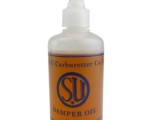SU Carb Dashpot oil
This subject is a regular message-board poser. Many of us have touted our preferences and discoveries whilst playing about over the years. One problem with trying to deal with it on the message board is the sheer volume of information offered and available against the time available to post it. Personally I try to keep my answers as short and informative as possible. Apart from the fact it costs a fortune to be active on the web site here in good old 'Blighty', long dissertations can put folk off from reading it all. I've posted information as I have found it on this subject several times, but not always the same answers as the situations and engine configurations vary so much. There are no hard and fast answers, but I gather from what I've heard recently some of my earlier advice posted has been misconstrued. So, to try and set that right, and give a good working basis on what to use where, here are my choices -
SU Dashpot oil - manufactured for the specific application of SUs in STANDARD applications. That is on engines that are completely standard as the manufacturer produced them. It is a little on the thin side, but the whole engine tuning data for each engine is based on using this oil. Used as such it works very well, especially where economy is the main goal and the car is driven very sympathetically.
ATF - 'automatic transmission fluid'. A very good substitute where the genuine SU dashpot oil isn't available for use in STANDARD spec engines.
20W fully synthetic engine oil - not to be confused with 20W50 engine oil of any sort. Just a 'straight weight' oil. I use this on practically anything where any modifications at all change the spec away from original. This includes any induction/exhaust changes no matter how small. Largely because the engine is likely to see more 'aggravated' use. Active use of the throttle pedal requires a more stabilizing effect on the dashpot piston along with slightly more resilience to give the desired pick-up. The main benefit of the synthetic type is its consistency over a very broad operating temperature range.
10W/40 engine oil - gives very similar results to the 20W fully synthetic oil as defined above. It is certainly easier and cheaper to get as most modern automotive engines use this oil. Semi-synthetic is best, although fully synthetic is as good but rare in the price/'what you have in the garage' stakes. Standard mineral oil is OK, but gives poorer performance until the engine warms up unlike the synthetic oils as outlined above. Again, this is by no means the 'be-all and end-all'. Others have distilled (literally in some cases) their own 'snake oil' that gives them what they're looking for. The problem with 'special brews' is that they're hard to repeat consistently. I just hope this list saves some agony.








